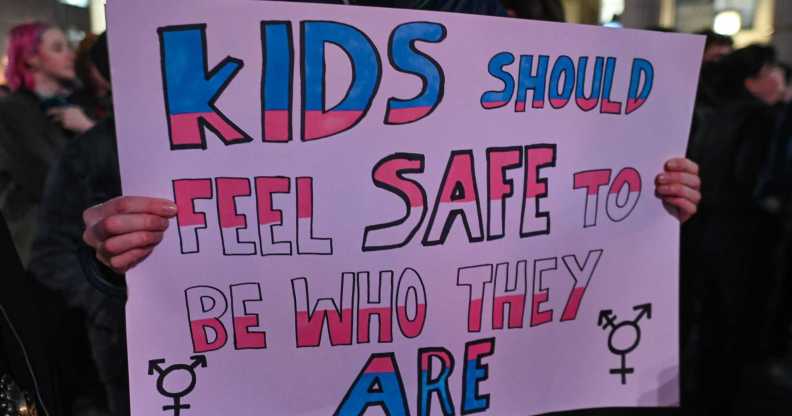Nearly 100,000 transgender minors live in anti-trans states, research finds

Nearly 100,000 trans minors live in a state that restricts their rights. (Artur Widak/NurPhoto via Getty Images)
A new report has found that nearly 100,000 transgender minors aged 13 to 17 are living in states that have passed anti-trans legislation.
The research, conducted by the Williams Institute at UCLA, determined that of the 300,000 young people in the US who identify as transgender, over one-third are living in a state that restricts trans rights.
More than 500 anti-LGBTQ+ bills were drawn up in 2023 alone – over half of those bills specifically targeted transgender youth.
This is a record amount, according to lead author Christy Mallory, Legal Director at the Williams Institute.

“While most of them did not pass, the ones that did significantly shifted the legal landscape for transgender youth,” he noted.
These restrictions range from banning trans minors’ access to gender-affirming healthcare, restricting their bathroom use, and limiting their participation in sport.
When broken down, the Williams Institute found that approximately 105,200 transgender minors aged 13-17 live in a state that banned access to gender-affirming healthcare this year.
While 92,700 of those individuals live in a state that passed its gender-affirming healthcare ban, and 26,000 live in a state that cannot enforce the ban due to a court order.
Gender-affirming healthcare refers to treatments that are designed to affirm an individual’s gender identity, which can range from puberty blockers, hormone replacement therapy, and – very rarely for minors – surgery.

Numerous studies have determined that allowing young trans people access to gender-affirming care can prevent emotional distress, depression, and self-harm. Just last month, a new study found that allowing trans people to access care can reduce suicidality by 55 per cent.
The practice of providing gender-affirming healthcare to trans minors is also backed by every major medical association in the US, including the American Academy of Pediatrics and the American Medical Association.
When it comes to using school bathrooms or other public facilities that align with gender identity, 32,700 transgender minors are living in states that restrict them.
Of that 32,700, 23,600 trans minors aged 13-17 live in states that officially passed laws banning trans students from using school bathrooms and other facilities that align with their gender identity in 2023.
Bathroom bans have a history of sparking violence against trans people – an already marginalised and stigmatised community.

For example, in 2019, Lauren Jackson, a trans woman from Oregon, was brutally attacked after emerging from a state park’s women’s restroom.
Alexa Negrón Luciano, a trans woman, was shot to death just hours after a customer complained about her using a women’s restroom at a fast food restaurant in Puerto Rico in 2020.
Last year, a trans man named Noah Ruiz was attacked and beaten when he left the women’s bathroom that he’d been told to use by a campground’s owner in Ohio. To top things off, he was then arrested by police.
The bans have also seen cisgender women harassed and attacked for using women’s bathrooms, with transphobes more likely to feel suspicious of the people using the stall next to them.
And, when it comes to access to school sports for transgender students – a subject that has been a major point of contention in America’s so-called ‘culture wars’ – an estimated 101,500 transgender minors are living in a state that restricts them.

While 14,200 trans minors aged 13-17 live in a state that officially passed a law to restrict their access to school sports, 11,000 live in one of four states that has not been able to enforce their ban on sports participation due to court orders.
Thankfully, it hasn’t all been bad.
The study also found that 146,700 trans minors – about half of trans youth in the US – are living in states that have gender-affirming care “shield laws” that support their access to healthcare by protecting doctors and parents who provide a minor with the gender-affirming care they seek.
Of that 146,700, 88,000 transgender youth live in states that passed these laws in 2023.
Let’s hope we see more of this in 2024.
How did this story make you feel?

